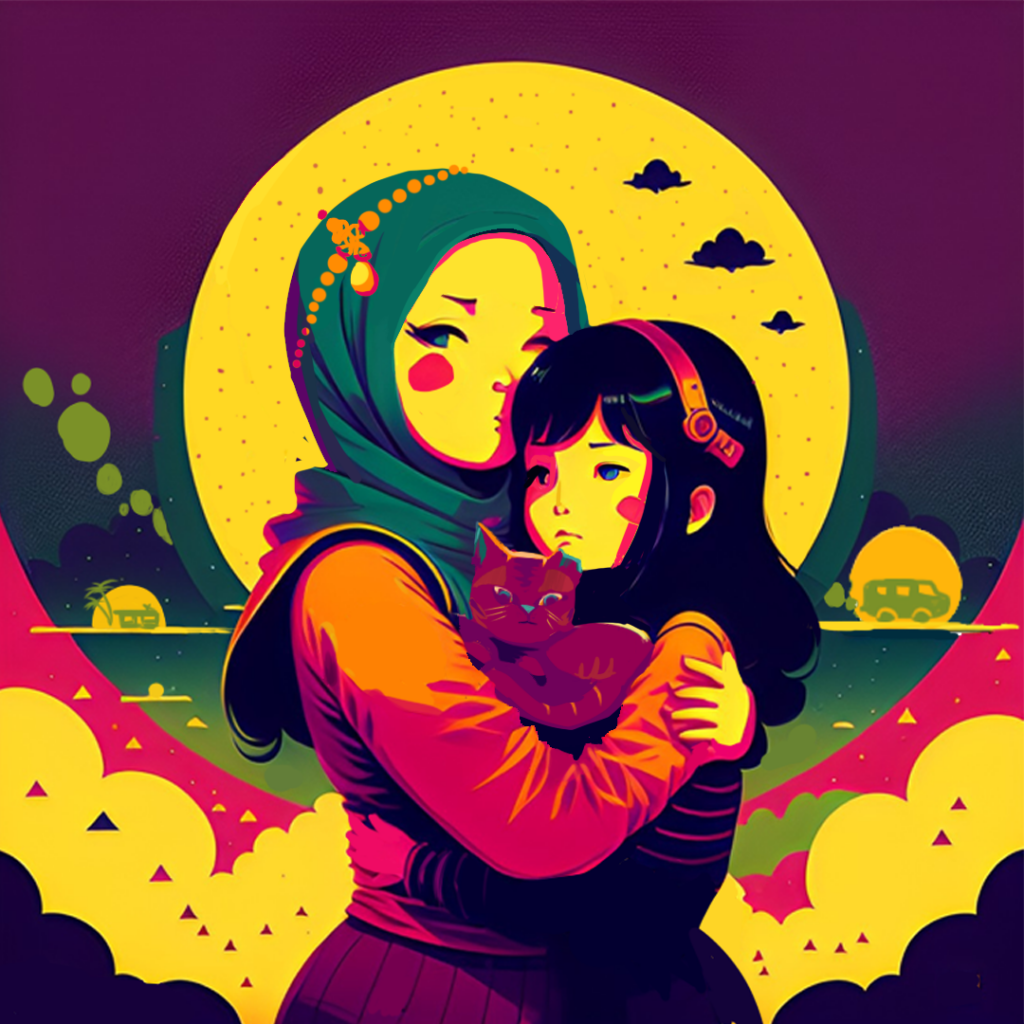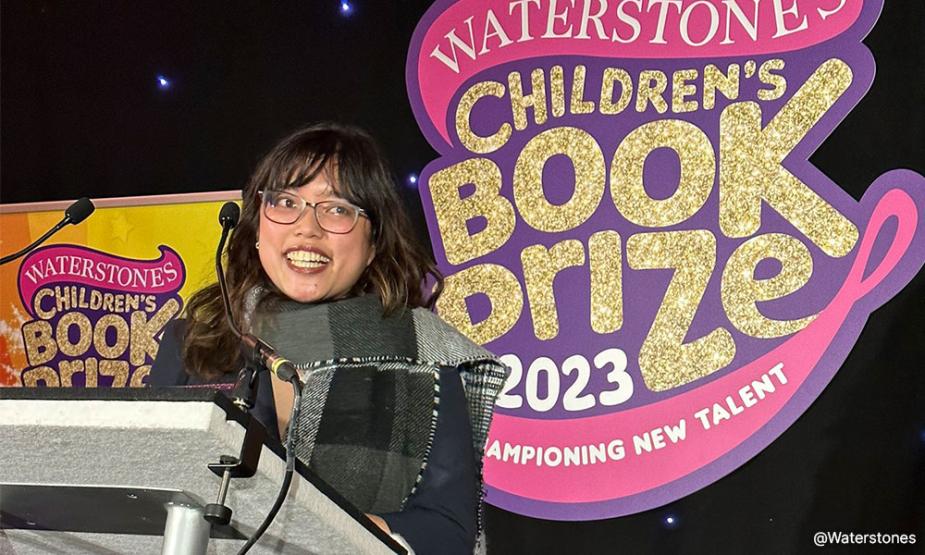by Sydney Gan

On a cold December day, somewhere in the bustle of East London, I sat down with Nadia Mikail to talk about her book, The Cats We Meet Along the Way. At the time, I couldn’t have known that I was talking to the winner of the Waterstones Book Prize 2023, an accolade that amplified Malaysian stories on a spectacular scale. Mikail’s book has been met with tremendous critical success; its cover plastered on every Waterstones across the UK and laureled with sung praises. Beyond this din, her quiet, moving story remains steadfast in its sincerity.
THE STORY
The Cats We Meet Along the Way is about one girl’s race against time to find her sister before the end of the world. Traveling on a road trip across Malaysia with her boyfriend, his family and her mother, Aisha hopes to come to terms with her past, the pressing present, and the looming future. It is an observant book, with intensely nuanced characters and a deep-seated maturity that struck me deeply while reading it. It is not a hero’s journey—Mikail allows the apocalypse to be inevitable. “Surely, not everybody is out there saving the world,” she tells me over plates of pancakes. And it is exactly this helplessness that sets up her story so effectively. Partly inspired by her own uncertainty during the pandemic, of watching travel borders close down and not knowing when she would see her family again, Mikail captures the isolating divide between oneself and the world as it crumbles around you. “It’s about the feeling that everything is ephemeral,” explains Mikail. “The sense of ‘I don’t know what’s going to happen now.’”
That is the beauty of the apocalypse: this conflict, forcing open a fascinating, existential exploration of Aisha’s place in the world amongst all her loved ones, and giving rise to a stunning study of grief and love in the context of children’s fiction. The end of the world is an inherently violent event, but this story is not about this unstoppable brutality. “It’s about looking back at your life and realizing it’s about the people you meet and the love you create along the way. It’s about hope nonetheless, otherwise, what is the point?”
Aisha’s narrative voice is a highlight of this book: Mikail conjures an awe-striking protagonist who is fleshed out, complex, and so beautifully angry. Mikail takes special note of incorporating “female anger” into her story; her dedication to the endeavor shining through in the relationship between the protagonist and her Mak. “Aisha represents a specific type of daughter in a specific type of culture,” Mikail says. In this subdued context of parental hierarchy and muted affection, it is impossible to even conceive an outright projection of rage and displeasure by the ‘good’ daughter. There can be no expressions of violence, no outright rebellions, all held back by the notion of disrespect and the necessity of filial piety. “Female rage is not being able to do all these things and having to carry around resentment. It is not being able to talk to one’s parents even though you love them so much, so it comes out in other ways, such as anger towards other people around you.”
Thus, Aisha’s resentment festers, wedging itself between her love for her mother and culminating in one of the most heartbreakingly simple exchanges between mother and daughter: an unexpectedly vulnerable question from Mak—“Do you think your sister will forgive me?”—and Aisha’s indignant response: “She thought abstractly about how unfair it was for [her mother] to bring up something like this after all this time and expect Aisha to know what to say.” Mikail’s concise writing style wrangles the enormous, near-untranslatable magnitude of a daughter’s love and resentment for her mother into stark clarity, supplying a heart-wrenching account of resolving unaddressed anger and grief only when time is rapidly running out.
THE CRAFT
In terms of the construction of the book and its influences, Mikail professes her love for classic coming-of-age stories. Works by Neil Gaiman and Louisa May Alcott in particular, infused with buoyant realism as they explore what it means to grow up, find themselves imbued within her writing. For this book especially, Mikail cites Emily St. John Mandel’s Station 11 as an inspiration. Both books depict the inevitability of the apocalypse with grace, seeking meaning beyond face values of heroism and destruction.
The Cats We Meet Along the Way is an interesting project, in that it came to be in a relatively unique way. Born from Mikail’s submission to Guppy Publishing’s Open Submission Competition in 2020, the initial draft was produced in two weeks—a wildly impressive feat driven by Mikail’s isolation during quarantine. In our conversation on the editing process, Mikail credits Guppy publisher and editor Bella Pearson for her work. Mikail described her experience as a collaborative effort, appreciating the structure that Pearson brought to her process. “When [Pearson] first talked about the edits, she made a very straightforward list,” Mikail says. “There was no micromanaging, only suggestions on things that would make the plot feel more fleshed out.” In terms of editing on a larger scale, Mikail is committed to drastic changes or rewriting in service to the narrative tone and central themes. This meticulousness and dedication to storytelling come across clearly in Cats—Mikail’s writing is nothing if not intentional.
While reading this book for the first time, what stood out to me most was how unabashedly Malaysian it was. The fact that it is a traditionally published young-adult book in the UK market dissuades from none of the authenticity that Mikail injects into her story. In theory, writing a book about home should be the easiest thing in the world—after all, one writes about what one knows. Mikail ruminates on her writing process, pointing out that she took care not to over-explain or cater her book to non-Malaysian tastes. Her unflinching stance is evident in the casually-untranslated Malay phrases peppered into dynamic dialogue, and the vivid descriptions of Malaysian culture that never fringe on exoticization. “Some things are more about the contexts than the words themselves,” Mikail says.
I find her dedication to telling genuine Malaysian stories admirable. As a Southeast Asian writer with limited representation in media, it is easier than one might think to fall into the trap of Westernization. It hasn’t always been this way, however, as Mikail confesses. The author recounts, with a bit of irony, her love for penning Malaysian ghost stories back in primary school; how the more she exposed herself to Western media as she matured, the less she wrote about her own culture. “I’m only just starting to write Malaysian stories again,” Mikail states. Her overall win of the Waterstone’s Children Book Prize is not just a tremendous accomplishment as a writer, but is also proof that Malaysian and other non-Western cultures do not have to be sanitized or exoticized to accommodate colonial palates and succeed. This award acknowledges our stories from home, honors sincere depictions of families from our culture and, above all, is a glowing example of Malaysian merit that does not have to be founded upon Western bases to be recognized.

As we speak, The Cats We Meet Along the Way is gearing up for a US edition release in October 2023: a global expansion of what is only the first of many Malaysian stories to come. Revealing details on her latest project, Mikail describes the story as an epic fantasy set in Kuching, exploring the aftermath of a chosen hero’s final defeat of the Big Bad of their story. “It’s harder,” Mikail says of her new book. “Just in terms of figuring out where I’m going with it… and I feel like I started out writing something more complicated in a number of ways, in terms of the society, the characters, and the plot of the book.” Given the beautiful simplicity of Mikail’s first book, it will be fascinating to witness her talent applied to larger, more complex stories.
For its short length and straightforward narrative, I can rave about The Cats We Meet Along the Way endlessly. In the grand sweep of the big picture, this story, this miniscule window into the lives of Aisha, her mother, and their companions as they search for her sister in a camper van trundling across definable borders and unextraordinary roads, never should have mattered as much as it does. But that is not the point. The point is that there is a camper car in the first place, and there are people in this car, a mere speck on the face of a ravaged Earth, who want to see it across the country. That against a backdrop of hopelessness, it is hope and grief that urge these characters forward in one last defiance of inevitability. The microscopic scale of this book, rendered seemingly insignificant by an impending apocalypse, betrays the sheer volumes it conveys: that at the end of the world, it is the small, quiet connections between one’s mother, one’s sister, and one’s lover that are amplified.
Foolishly and lovingly, they persist, and the end of all things is reduced to a spot on the horizon.
A special thank you to Nadia Mikail for the interview, and to her family (and cat) for being incredibly accommodating.